
views
Deciding Whether to Hire a Lawyer

Decide if you want to pursue matters on your own. Although it’s always tempting to tackle a legal matter on your own, it’s rarely wise to do so, unless you’re just trying to defeat a minor traffic or parking ticket. Once you move into the realm of contractual disputes and other highly complex matters, you really do need the help of an experienced, licensed attorney to guide your steps. If you try to handle a contract dispute as a layperson, you’ll probably just be guessing at how courts normally interpret complicated contractual issues. You will also be unable to easily navigate local court rules and the rules of civil procedure. These are challenging for even experienced attorneys who use them on a regular basis. While you are certainly free to conduct your own informal legal research on the Internet, only an experienced, practicing lawyer can guide you through the different stages of negotiating contractual disputes with another party. Likewise, all lawsuits and arbitration proceedings require highly trained professionals to present legal matters in the best possible light for the respective parties.

Do your research. If you plan to work on your own, then you will need to research the procedures of court. This information is critical. Should you represent yourself in complicated contractual litigation, you stand a serious chance of quickly losing favor with the judge as you fail to file all of the required pleadings and motions in a timely manner.

Contact and hire a lawyer. If you can afford it, it's best to get a lawyer to defend you. Even if you can't really afford a lawyer, if the breach of contract case could cost you a substantial amount, you might look into borrowing enough money to hire a lawyer. Winning your case could very easily depend on whether you have a trained professional on your side. Always remember that it’s best to handle this type of serious matter with the help of a barlicensed attorney who has handled similar contractual conflicts in the past. A lawyer with no experience with breach of contract cases may not know what they are doing and will be less helpful than a lawyer who has dealt with similar situations.
Reviewing the Contract and Any Correspondence
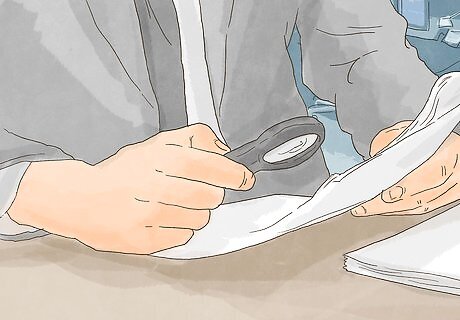
Review the contract. If you have an attorney, sit down together and review the contract to see if you are in breach. You will want to know if you did indeed violate the contract or if the other party is fabricating the claim. Be sure to be honest with your attorney about the situation, so that he or she can give you the best legal advice. It is quite possible that you breached the contract on purpose. It may be cheaper to pay the damages for breaching the contract than fulfilling its original terms. If you breached on purpose your primary goal will be to reduce the amount of damages you have to pay under the contract. Although it’s possible that you only entered into an “oral contract,” those are fairly rare today. Most states have now passed laws which require all contracts to be in writing when the goods or services involved are worth $500 or more. Written contracts are always preferable because they allow you to detail how each party must uphold its duties and how both sides should respond if any disagreements or disputes arise.

Review all correspondence from the other party. This includes any discussion of the contract in question or an official "demand letter" from the other party. A demand letter sent from the other party’s lawyer is simply a letter that outlines what they think your contractual obligation is. For instance, it could demand that you pay a specific amount for services already rendered. Once you get a demand letter, the ball is in your court. It’s then up to you and your attorney to decide how to respond to it. Make sure that the demand letter, if you have received one, complies with state law. Many states require that a pre-lawsuit letter is sent, in order to increase the chance of out-of-court settlement.

Decide whether the claim is part of a scam. Although most demand letters sent out are legitimate, it’s always important to carefully review the signature and the contents. Never just assume you’re in business with someone if the name isn’t readily familiar. There are scam artists who do send out such mail, in the hopes that you will accidentally provide critical personal or business information that can be used for identity theft purposes. If you don’t know the individual or company contacting you, there’s obviously no need to respond. If you’re certain that the letter is legitimate, only provide the least amount of necessary information, in keeping with your lawyer’s advice.
Writing a Letter in Response

Respond carefully. The letter may become part of future legal proceedings. Regardless of how upset you may be regarding unfair accusations or possible threats contained in the demand letter, respond with calm and accurate language. Never try to match threats with anyone, as this can cloud the issues involved for a judge or jury that may have to evaluate a later lawsuit. Whatever you do, be sure to respond both promptly and politely.

Decide on the tone and type of response you will send. The three most common responses to a demand letter include: (1) truthfully denying that you have breached the contract, (2) asserting an affirmative defense indicating that circumstances beyond your control prevented you from acting, or (3) apologizing for your actual error and asking if you can “cure” or “fix” the breach in a specific way by a new, mutually agreeable date. Keep in mind that if you do provide an acceptable affirmative defense, you will still need to propose an agreeable way to “cure” the unavoidable breach.

Write your response letter. Carefully quote the terms of your contract and attach documentary proof, if necessary, that clearly indicates how you upheld your duties or which circumstances beyond your control prevented you from timely handling them. Unless you’re determined to get out of the contract and have your lawyer file a lawsuit, politely suggest alternative ways you can readily “cure” any perceived contract breach. Remember to include notation of any errors included in the initial demand letter. Correct any factual errors but be sure to keep the tone calm and professional. Properly format your letter. Make the correspondence as professional as possible.

Print, sign, and prepare your letter for mailing. Make one copy of your reply for each party and one for yourself. For example, if there are two Plaintiffs, you should make three copies, one for each of them, and one for yourself.
Responding to a Lawsuit for Breach of Contract

Receive the complaint. If the other party files a lawsuit, you will be sent a copy of the complaint and a summons. You should read the complaint closely. The complaint will spell out the set of facts that the other party believes warrants the award of money damages for the breach of contract.

Come up with defenses. Once you receive the complaint, you will have a set amount of time to respond. You should meet with your lawyer and discuss what kinds of defenses you want to raise. Even if everything alleged in the complaint is true, you nevertheless may have defenses for not performing your obligations under the contract. These defenses must be raised in your answer. In a breach of contract suit, common defenses include: Misrepresentation or fraud. You could argue that misrepresentations were made during the contract negotiations, and therefore you would never have formed the contract but for the fraud. Impossibility. You can argue that the contract cannot be performed because circumstances have changed. For example, it may no longer be possible to deliver goods if the goods were destroyed in a fire or storm. Unconscionability. You could allege that the terms of the contract are grossly unfair and that you only consented to the contract because of unequal bargaining power. The statute of limitations has expired. Depending on your state, a breach of contract lawsuit will need to be brought within a certain number of years. If the lawsuit is filed after the deadline, then you can have the case dismissed.

Draft an answer. Your state may have “fill in the blank” answer forms that you could use. California’s form is here. Look on your court’s website to see if forms are available. Also, you can look at your state’s Supreme Court website. If no form is available for your state, then you can use the plaintiff’s complaint as a template for your answer. Type the same header information into your blank word processing document. The header information includes the court name, the names of the parties, the judge hearing the case, and the case number. Under the heading, center the words “Answer to Complaint for Breach of Contract” in all caps and bolded. Then, in the body of your motion, you should admit, deny, or claim lack of knowledge with respect to every allegation in the complaint. Be sure to number your paragraphs and respond to only one factual allegation per paragraph. Then, you should include any affirmative defenses (statute of limitations, impossibility, etc.) and state the facts that support your defenses. At the bottom, append a signature block and sign the motion. Also state how you are serving notice to the plaintiff, either by mail or by personal service, and state the date. You may not want to respond if you have no credible defense. In this case, you would simply suffer a default judgment, which you would then pay. Taking a default judgment can save you on time and attorney’s fees.

File the answer. Once you have drafted your answer, you will need to file it with the court. Be sure to keep multiple copies for yourself. You will also need one copy to send to the plaintiff. You will probably need to pay a filing fee. If you can’t afford the fee, ask the court clerk for a fee waiver form and fill it out. Be sure to have the court clerk stamp every copy of your answer with the date.

Serve the answer. You need to send a copy of your answer to the plaintiff. You can serve notice in a variety of ways. Typically, courts allow parties to mail a copy to the other side. You also can have your answer served personally using either the sheriff or a professional process server. If you have the answer served using the sheriff or a professional process server, then you will need to fill out a Proof of Service form. This form may go by a different name, such as an “Affidavit of Service.” But the form serves the same purpose: to attest that the server made service on the plaintiff. You will have to attach this form to the copy of your answer that you want served. After service, the sheriff or server will sign it and then mail it back to you. You must then file it with the court as proof that you served your answer on the plaintiff. You will have to pay for service of process. Typically, a private process server costs between $45-75.

Engage in discovery. Discovery is a process whereby each party requests documents in the possession or control of the other party. They may also request that witnesses answer questions orally or in writing. Discovery can be a long, drawn-out process. Much of the costs of the litigation are incurred during discovery. If you appear in small claims court, then there may be limited, or no, discovery.

Prepare for a deposition. As part of discovery, you should anticipate being deposed. In a deposition, an attorney will ask you questions under oath. The deposition is tactical in nature. It is an opportunity for the other side to gain information about what you know to help it with its lawsuit. But statements made in a deposition can also be introduced at trial to impeach your testimony. So you will need to prepare for the deposition extensively. You should review all relevant documents: the contract, any correspondence with the other party, and any notes or internal memoranda that you may have made. This will refresh your memory so that you don’t say anything in the deposition that is patently untrue. You can also prepare for the deposition by having your attorney do a mock deposition, during which she peppers you with questions regarding the lawsuit. Sit for the deposition. The deposition will be held in an attorney’s office. In addition to attorneys, a court reporter will be present to record the questions and answers. To be effective during the deposition, remain calm and listen to the questions closely. Seek clarification if you do not understand a question. If you do not know an answer, then say, “I don’t know.” Do not guess.
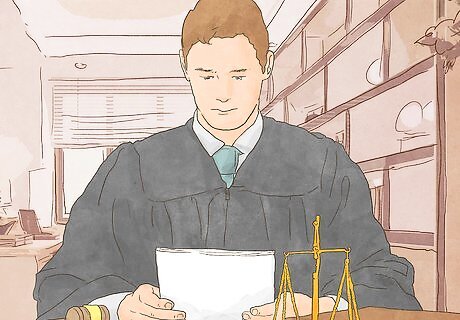
File a motion for summary judgment. After the close of discovery, each party may file a motion with the court asking for the court to decide in their favor. A summary judgment motion argues that no material facts are in dispute and that judgment is appropriate as a matter of law. As a defendant, you can file a motion for summary judgment. Typically, you can argue that you are entitled to summary judgment because no valid contract exists or that no evidence of damages exist.
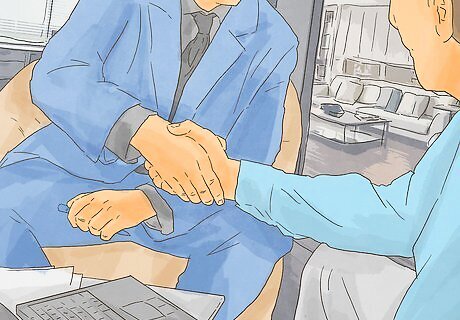
Consider settlement. If you lose summary judgment, then you may want to settle with the plaintiff depending on the dollar amount of the lawsuit. If the plaintiff is seeking an outrageous sum of money, then you may want to settle rather than run the risk of losing at trial. Of course, if the plaintiff is seeking a low amount of damages, you may want to settle anyways, to avoid expending the time and money going to trial. If you have a lawyer, you should always talk about potential settlement, and be open to settlement at any point in the litigation.
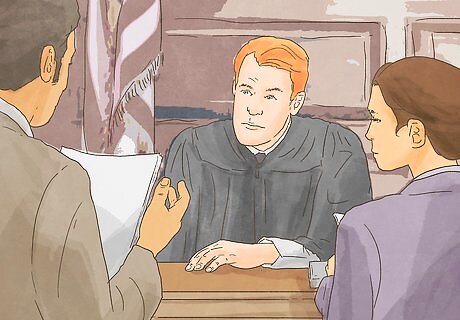
Go to trial. At the trial, both parties will introduce evidence and question witnesses. You or your attorney will have to deliver an opening statement, examine and cross-examine witnesses, and then deliver a closing argument. Your trial may take place in small claims court. Here, the rules are much more informal. You probably cannot even have an attorney represent you.
Settling Your Conflict
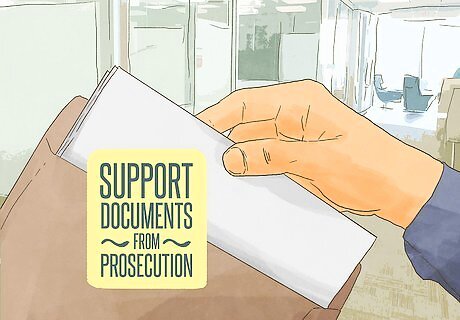
Request copies of any documents the other party claims support their allegations. Even if the other party refuses to provide you with these materials, their behavior could show a judge at a later date that they were not responding to your “good faith” attempts to resolve the matter without litigation. After discussing it with your attorney, consider providing copies of documents related to your business contract to the other side if requested. However, instead your lawyer may advise you to go ahead and pursue either arbitration or a declaratory judgment action.
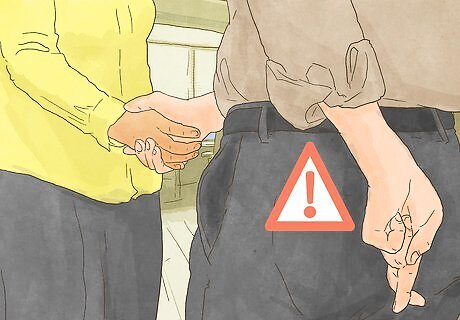
Consider taking preemptive measures. For instance, if you and your lawyer decide that the other party is not attempting to deal fairly with you or is purposefully misstating facts about what has transpired, give serious thought to filing a declaratory judgment lawsuit. Parties often file a declaratory judgement action in an effort to get a court to evaluate all that has taken place to date and to rule on whether or not either party has a legal duty to act now or to compensate the other party for failing to perform as required under the contract. It’s often to your advantage to take this first move because it allows you to frame the arguments in your favor. Dispute in the manner most favorable to your position. According to the American Bar Association, the main reason people file a declaratory judgment action is to "settle important questions of law before the controversy has reached a more critical stage." While they are commonly used in many insurance law cases, you’ll see parties seek declaratory judgments in a wide variety of legal battles. Of course, the validity of your claim will largely determine whether or not this approach proves beneficial to you.
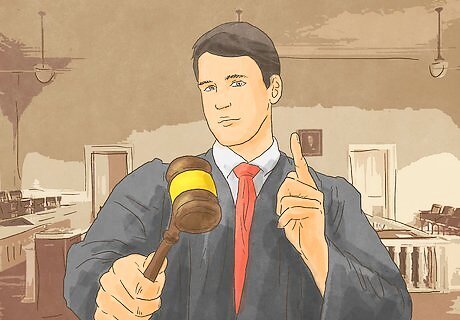
Pursue binding arbitration. If your contract provides for resolving all contractual disputes by entering into binding arbitration, you have a right to invoke that privilege once you and your lawyer decide that the other party is refusing to negotiate a simple resolution to your contract dispute. Arbitration offers unique advantages to you and the other party. It allows you to: (1) choose your arbitrator, (2) proceed immediately instead of waiting for a matter to appear on a court docket, and (3) handle the matter in an efficient yet often less formal manner. Any constraints imposed upon handling disagreements through arbitration should already be clearly stated in your contract.



















Comments
0 comment